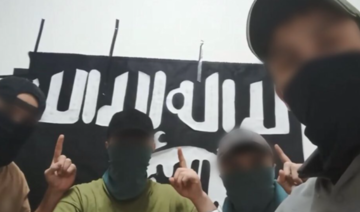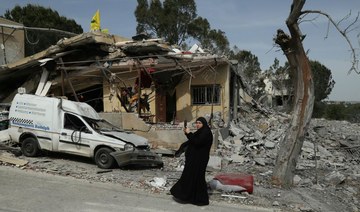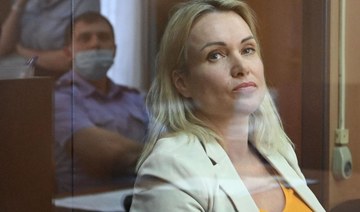BELGRADE: A teenage boy opened fire at a school in Serbia’s capital Wednesday, killing eight children and a school guard, police said. Six more children and a teacher were injured and hospitalized.
Police identified the shooter by his initials, K.K., and said he had opened fire with his father’s gun. He was arrested in the school yard, police said. A statement identified him as a student at the school in central Belgrade who was born in 2009.
Police said they received a call about the shooting at the Vladislav Ribnikar primary school around 8:40 a.m. Primary schools in Serbia have eight grades, starting with first grade.
“I was able to hear the shooting. It was non-stop,” a student who was in a sports class downstairs when the gunfire erupted. “I didn’t know what was happening. We were receiving some messages on the phone.”
Unlike in the United States, mass shootings in Serbia and in the wider Balkan region are extremely rare; none were reported at schools in recent years. In the last mass shooting, a Balkan war veteran in 2013 killed 13 people in a central Serbian village.
Experts, however, have repeatedly warned of the number of weapons left over in the country after the wars of the 1990s. They also note that decades-long instability stemming from the conflicts as well as the ongoing economic hardship could trigger such outbursts.
Local media footage from the scene showed commotion outside the school as police removed the suspect, whose head was covered as officers led him to a car parked in the street.
The student who heard the shooting, who was identified only by her initials, E.M., because of her age, described the suspect as a “quiet guy” who “looked nice.”
“He was having good grades, but we didn’t know much about him,” the student added. “He was not so open with everybody. Surely I wasn’t expecting this to happen.”
Milan Milosevic, who said his daughter was in a history class when the shooting took place, told N1 television that he rushed out when he heard what had happened.
“I asked where is my child but no one could tell me anything at first,” he said. “Then she called and we found out she was out.”
“He (the shooter) fired first at the teacher and then the children who ducked under the desks,” Milosevic quoted his daughter as saying. “She said he was a quiet boy and a good student.”
Police sealed off the blocks around the school, in the center of Belgrade.
Teenage boy kills 8 children, guard at school in Belgrade
https://arab.news/ce6er
Teenage boy kills 8 children, guard at school in Belgrade
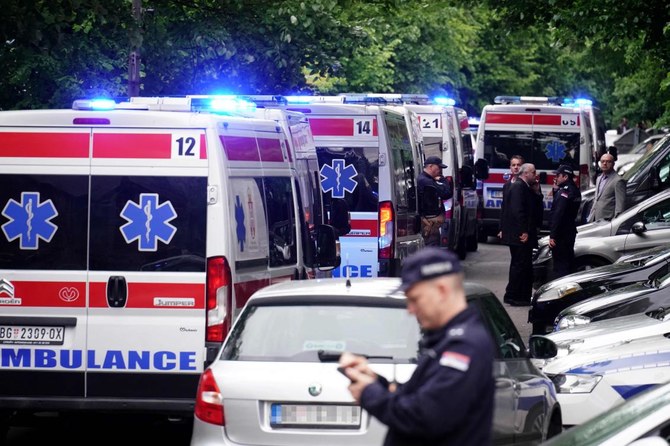
- Unlike in the US, mass shootings in Serbia and in the wider Balkan region are extremely rare
- Police sealed off the blocks around the school, in the center of Belgrade
France charges Daesh official’s ex-wife with crimes against humanity
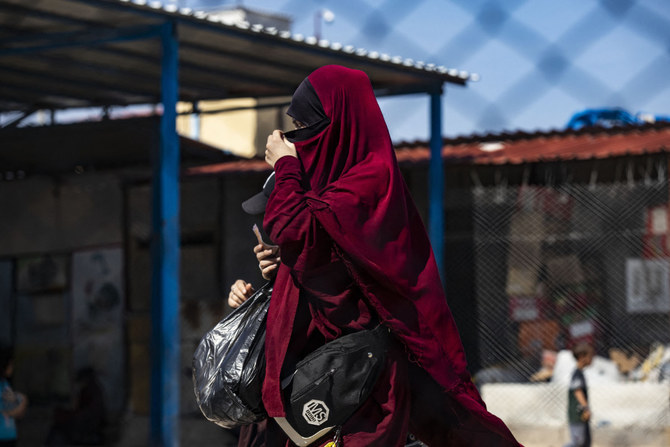
- The woman identified only as Sonia M. was accused by a Yazidi woman of raping her twice and knowing that her husband was raping her, Le Parisien reported
- The Yazidi woman was 16 when she was taken captive by Daesh militants and forced into slavery by top Daesh official Abdelnasser Benyoucef
PARIS: France has charged the ex-wife of a top Daesh official with crimes against humanity on suspicion of enslaving a teenage Yazidi girl in Syria, French media reported.
A woman identified as Sonia M., the former wife of the jihadist group’s head of external operations Abdelnasser Benyoucef, was charged on March 14, Le Parisien said Saturday.
The Yazidi woman, who was 16 when she was forced into slavery by Benyoucef, accused Sonia M. of raping her twice and knowing that her husband was raping her, the report said.
The woman, now 25, said she was held for more than a month in 2015 in Syria, where she was not allowed to eat, drink or shower without Sonia M.’s permission.
Sonia M. denied the allegations against her in a March 14 interview with French investigators, saying “only one rape” had been committed by her former husband.
The teenager “left her room freely, ate what she wanted, went to the toilet when she needed to,” she said in her interview, seen by AFP.
Sonia M.’s lawyer Nabil Boudi slammed the charges as “opportunistic accusations,” saying that prosecutors were seeking “to make her responsible for the most serious crimes, because the courts have not managed to apprehend the real perpetrators.”
An arrest warrant has been issued for Benyoucef, according to a source close to the investigation.
France launched an investigation in 2016 into genocide, crimes against humanity and war crimes committed against ethnic and religious minorities in Iraq and Syria since 2012.
The probe has focused on crimes suffered by members of the Yazidi and Christian communities as well as members of the Sheitat tribe, according to France’s PNAT anti-terror unit.
“The aim is to document these crimes and identify the French perpetrators who belong to the Islamic State organization,” PNAT told AFP.
France’s foreign minister looks to prevent Israel-Hezbollah conflict escalation in Lebanon visit
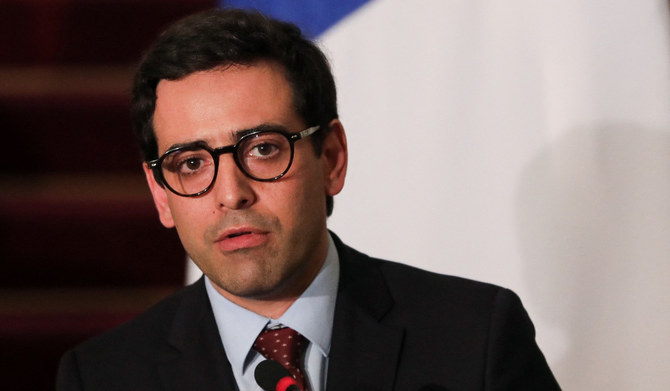
- Israel has killed more than 34,000 Palestinians, according to Gaza’s Health Ministry
- Israel has remained cautious on the French initiative, although Israeli and French officials say Israel supports efforts to defuse the cross-border tensions
BEIRUT: France’s foreign minister will push proposals to prevent further escalation and a potential war between Israel and Iran-backed Hezbollah during a visit to Lebanon on Sunday as Paris seeks to refine a roadmap that both sides could accept to ease tensions.
France has historical ties with Lebanon and earlier this year Stephane Sejourne delivered an initiative that proposed Hezbollah’s elite unit pull back 10 km (6 miles) from the Israeli border, while Israel would halt strikes in southern Lebanon.
The two have exchanged tit for tat strikes in recent months, but the exchanges have increased since Iran launched a barrage of missiles on Israel in response to a suspected Israeli attack on the Iranian embassy in the Syrian capital Damascus that killed members of Iran’s Revolutionary Guards Corps’ overseas Quds Force.
France’s proposal, which has been discussed with partners, notably the United States, has not moved forward, but Paris wants to keep momentum in talks and underscore to Lebanese officials that Israeli threats of a military operation in southern Lebanon should be taken seriously.
Hezbollah has maintained it will not enter any concrete discussion until there is a ceasefire in Gaza, where the war between Israel and Islamist militant group Hamas has entered its sixth month.
Israel has also said it wants to ensure calm is restored on its northern border so that thousands of displaced Israelis can return to the area without fear of rocket attacks from across the border.
“The objective is to prevent a regional conflagration and avoid that the situation deteriorates even more on the border between Israel and Lebanon,” foreign ministry deputy spokesperson Christophe Lemoine said at a news conference.
Lebanese Prime Minister Najib Nikati and Lebanese army chief Joseph Aoun met French President Emmanuel Macron earlier this month, where they discussed the French proposal.
In a letter addressed to the French embassy in Beirut in March, Lebanon’s foreign ministry said Beirut believed the French initiative would be a significant step toward peace and security in Lebanon and the broader region.
Local Lebanese media had reported the government had provided feedback to the French on the proposal.
French officials say the responses so far have been general and lack consensus among the Lebanese. While they deem it too early for any form of accord, they believe it is vital to engage now so that when the moment comes both sides are ready.
Paris will also underline the urgency of breaking the political deadlock in the country. Lebanon has neither a head of state nor a fully empowered cabinet since Michel Aoun’s term as president ended in October 2022.
Israel has remained cautious on the French initiative, although Israeli and French officials say Israel supports efforts to defuse the cross-border tensions.
“The flames will flicker and tensions will continue,” said a Lebanese diplomat. “We are in a situation of strategic ambiguity on both sides.”
France has 700 troops based in southern Lebanon as part of the 10,000-strong United Nations peacekeeping force.
Officials say the UN troops are unable to carry out their mandate and part of France’s proposals are aimed at beefing up the mission by strengthening the Lebanese army.
After Lebanon, Sejourne will head to Saudi Arabia before traveling to Israel.
Arab and Western foreign ministers, including US Secretary of State Antony Blinken, will hold informal talks on the sidelines of a World Economic Forum event in Riyadh to discuss the Gaza war with Palestinian President Mahmoud Abbas.
Two Russian journalists jailed on ‘extremism’ charges for alleged work for Navalny group
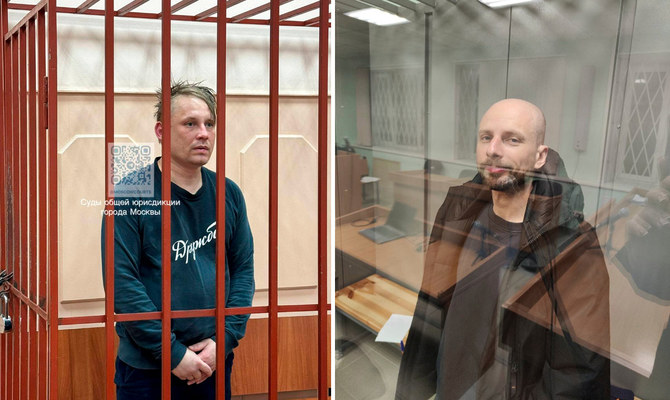
- Konstantin Gabov and Sergey Karelin both denied the charges for which they will be detained for a minimum of two months before any trials begin
- Russia’s crackdown is aimed at opposition figures, journalists, activists, members of the LGBTQ+ community, and other dissenters
LONDON: Two Russian journalists were arrested by their government on “extremism” charges and ordered by courts there on Saturday to remain in custody pending investigation and trial on accusations of working for a group founded by the late Russian opposition politician Alexei Navalny.
Konstantin Gabov and Sergey Karelin both denied the charges for which they will be detained for a minimum of two months before any trials begin. Each faces a minimum of two years in prison and a maximum of six years for alleged “participation in an extremist organization,” according to Russian courts.
They are just the latest journalists arrested amid a Russian government crackdown on dissent and independent media that intensified after its full-scale invasion of Ukraine more than two years ago. The Russian government passed laws criminalizing what it deems false information about the military, or statements seen as discrediting the military, effectively outlawing any criticism of the war in Ukraine or speech that deviates from the official narrative.
A journalist for the Russian edition of Forbes magazine, Sergei Mingazov, was detained on charges of spreading false information about the Russian military, his lawyer said Friday.
Gabov and Karelin are accused of preparing materials for a YouTube channel run by Navalny’s Foundation for Fighting Corruption, which has been outlawed by Russian authorities. Navalny died in an Arctic penal colony in February.
Gabov, who was detained in Moscow, is a freelance producer who has worked for multiple organizations, including Reuters, the court press service said. Reuters did not immediately comment on the ruling by the court.
Karelin, who has dual citizenship with Israel, was detained Friday night in Russia’s northern Murmansk region.
Karelin, 41, has worked for a number of outlets, including for The Associated Press. He was a cameraman for German media outlet Deutsche Welle until the Kremlin banned the outlet from operating in Russia in February 2022.
“The Associated Press is very concerned by the detention of Russian video journalist Sergey Karelin,” the AP said in a statement. “We are seeking additional information.”
Russia’s crackdown on dissent is aimed at opposition figures, journalists, activists, members of the LGBTQ+ community, and ordinary Russians critical of the Kremlin. A number of journalists have been jailed in relation to their coverage of Navalny, including Antonina Favorskaya, who remains in pre-trial detention at least until May 28 following a hearing last month.
Favorskaya was detained and accused by Russian authorities of taking part in an “extremist organization” by posting on the social media platforms of Navalny’s Foundation. She covered Navalny’s court hearings for years and filmed the last video of Navalny before he died in the penal colony.
Kira Yarmysh, Navalny’s spokeswoman, said that Favorskaya did not publish anything on the Foundation’s platforms and suggested that Russian authorities have targeted her because she was doing her job as a journalist.
Evan Gershkovich, a 32-year-old American reporter for The Wall Street Journal, is awaiting trial on espionage charges at Moscow’s notorious Lefortovo Prison. Both Gershkovich and his employer have vehemently denied the charges.
Gershkovich was detained in March 2023 while on a reporting trip and has spent over a year in jail; authorities have not detailed what, if any, evidence they have to support the espionage charges.
The US government has declared Gershkovich wrongfully detained, with officials accusing Moscow of using the journalist as a pawn for political ends.
The Russian government has also cracked down on opposition figures. One prominent activist, Vladimir Kara-Murza was sentenced to 25 years.
Music ‘haven of freedom’ Tangiers hosts global jazz festival
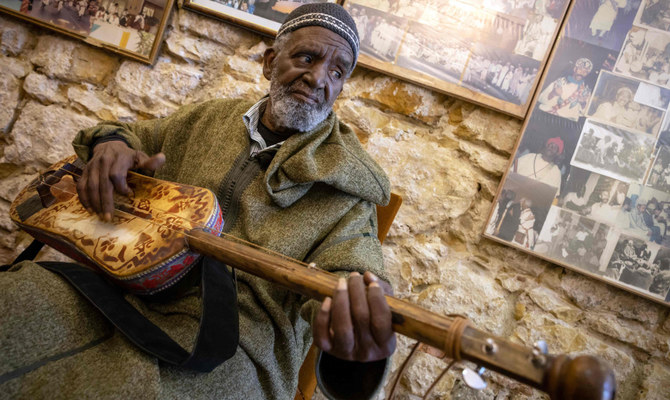
- This year’s Jazz Day will be held over four days starting on Saturday, during which talks and open-air performances will be held in Tangiers
TANGIERS, Morocco: The Moroccan city of Tangiers, which has a long history as a haven of inspiration for American jazz musicians, will host UNESCO’s International Jazz Day for the first time on Tuesday.
Over the last century, jazz greats such as Randy Weston, Idrees Sulieman and Max Roach all crossed the Atlantic to play and record music in the North African port city, perched on the edge of the Strait of Gibraltar.
“The city has had a fascinating power of attraction on a wave of intellectuals and musicians,” Philippe Lorin, the founder of an annual Tangiers jazz festival, told AFP.
“It’s not for nothing that a writer once said there was always a cruise liner in New York preparing to sail for Tangiers.”
This year’s Jazz Day will be held over four days starting on Saturday, during which talks and open-air performances will be held in Tangiers.
The festivities will culminate in an “All-Star Global Concert” on Tuesday led by jazz icon Herbie Hancock, also featuring bassists Marcus Miller and Richard Bona, as well as guitarist Romero Lubambo.
The city’s cosmopolitan artistic reputation stems from its location between Africa and Europe as well as its history, having been administered by several colonial powers from 1923 to 1956, the year Morocco gained independence.
This melting pot of influences prompted visits from international writers and poets, notably from the Beat Generation movement, as well as African American musicians seeking to find “their African roots,” Moroccan historian Farid Bahri told AFP.
Lorin said that Tangiers “was a haven of freedom — just like jazz music.”
A pivotal moment in the city’s musical history came in 1959, when Tangiers jazz promoter Jacques Muyal — then just a teenager — recorded a session with trumpeter Idrees Sulieman, pianist Oscar Dennard, bassist Jamil Nasser and drummer Buster Smith at the Radio Tanger International studio.
The recording gained renown in jazz circles decades before its distribution as “The 4 American Jazzmen In Tangier” album in 2017.
Bahri, the author of “Tangiers, a world history of Morocco,” said “the presence of American musicians in Tangiers was also linked to a very active American diplomacy.”
Famous US pianist Randy Weston settled in Tangiers for five years after visiting 14 African countries in 1967 during a tour organized by the US State Department.
The Brooklynite virtuoso would play a key role in building the musical reputation of the city, to which he dedicated his 1973 album “Tanjah.”
“Randy was an exceptional, kind and respectful man,” said Abdellah El Gourd, a 77-year-old Moroccan legend of gnawa music, a centuries-old style played with a three-stringed lute and steel castanets, rooted in West African rituals and Sufi traditions.
“He gave a lot to the city and its musicians,” added the friend and collaborator of Weston, who died in 2018.
Together, El Gourd and Weston blurred the lines of their respective genres, creating the beginnings of jazz-gnawa fusion, which remains a key part of Tangiers’ musical legacy.
“The language barrier was never a problem because our communication was through (musical) scales,” El Gourd recalled in a rehearsal room lined with old photos and memorabilia from the years he toured with Weston and jazz saxophonist Archie Shepp.
“Our language was music.”
The two men’s collaborative work would years later yield the acclaimed 1992 album “The Splendid Master Gnawa Musicians of Morocco.”
Two years after settling in the city, Weston opened the African Rhythms jazz club, above the iconic Cinema Mauritania in downtown Tangiers.
“We used to rehearse there,” El Gourd recalled. “Randy would invite his musician friends. It was a beautiful time.”
With El Gourd’s help, Weston launched Tangiers’ first-ever jazz festival in 1972, featuring big names such as drummer Max Roach, flautist Hubert Laws, double-bassist Ahmed Abdul-Malik, and saxophonist Dexter Gordon.
“It was quite a unique experience, because it was the first time we played in front of such a large audience,” said El Gourd, who was then used to small crowds for gnawa performances.
Weston and El Gourd’s festival was only held once.
But three decades later it inspired Lorin to create the Tanjazz festival, which is held in the port city every September.
US announces $6 billion in security aid for Ukraine

- The package is the second this week, following another valued at $1 billion
- Ukraine’s President Volodymyr Zelensky said the US delay in approving new assistance has been costly for Kyiv
WASHINGTON: Defense Secretary Lloyd Austin on Friday announced the United States will provide key air defense munitions and artillery rounds to Ukraine as part of a $6 billion military aid package that is its largest ever for Kyiv.
The package is the second this week, following another valued at $1 billion that was announced just after US President Joe Biden signed a much-delayed bill to provide new funding for Ukraine as it struggles to hold back Russian advances.
“This is the largest security assistance package that we’ve committed to date,” Austin told journalists following the conclusion of a virtual meeting of dozens of Kyiv’s international supporters.
“They need air defense interceptors, they need artillery systems and munitions. They need... armored vehicles, they need maintenance and sustainment. So all of those kinds of things are included” in the package,” he said.
Ukraine has in recent months pleaded for more air defenses from its Western allies as it struggles to fend off a surge in deadly attacks on civilian infrastructure, and the new package includes interceptors for both Patriot and NASAMS air defense systems.
But unlike the $1 billion package announced Wednesday, which featured items that will be drawn from US stocks, the latest assistance will be procured from the defense industry, meaning it will take longer to arrive on the battlefield.
Speaking at the opening of the virtual meeting, Ukraine’s President Volodymyr Zelensky said the US delay in approving new assistance has been costly for Kyiv.
“While we were waiting for a decision on the American support, the Russian army managed to seize the initiative on the battlefield,” Zelensky said.
“We can still now not only stabilize the front, but also move forward, achieving our Ukrainian goals in the war,” he said, while noting that “Ukrainian defenders need your sufficient and timely support.”
A senior US defense official said this week that “Ukrainian forces have been rationing their ammunition for quite some time, rationing their capabilities.”
Aid from the United States and other countries “will enable the Ukrainians to begin to retake the initiative,” but “this will not be a rapid process,” the official said on condition of anonymity.
“The Ukrainians will need to rebuild quite a bit to take on board all of these new supplies... and ensure that they can defend their positions. So I would not forecast any large-scale offensive in the near-term,” the official added.
The United States has been a key military backer of Ukraine, committing tens of billions of dollars in security assistance since Russia launched its full-scale invasion in February 2022.
But prior to this week, Washington had announced new aid for Ukraine on just one other occasion this year, a $300 million package in March that was only made possible by using money that the Pentagon had saved on other purchases.
A squabbling Congress had not approved large-scale funding for Kyiv for nearly a year and a half, but eventually took action starting last week after months of acrimonious debate among lawmakers over how or even whether to help Ukraine defend itself.
The US House of Representatives on April 20 approved legislation authorizing $95 billion in aid funding, including $61 billion for Ukraine, while the Senate passed the measure on Tuesday and Biden signed it into law the following day.





